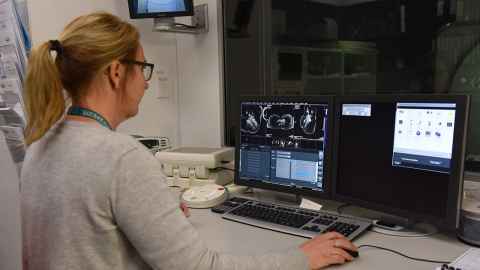Magnetic Resonance Imaging
Magnetic Resonance Imaging (MRI) is a medical imaging modality that uses very high-field strength magnets to obtain diagnostic images of the human body.

Subject overview
MRI is a people-orientated discipline and integrates aspects of health sciences and imaging technology. MRI technologists are health professionals who utilise their knowledge of human anatomy, pathophysiology, technology and physics in order to obtain images of optimal quality. These images assist doctors in diagnosing a wide range of neurological, musculoskeletal and body pathologies.
MRI is a patient-centred profession. The role involves acting as an advocate for patients, displaying a high level of professionalism and functioning as part of a multidisciplinary team. MRI technologists are required to perform high-quality diagnostic imaging procedures and ensure holistic patient care.
The role of the MRI technologist is ever-changing with the introduction of more complex technologies, increasing demand on clinical imaging services and ongoing educational opportunities.
The University of Auckland offers the only MRI qualification in New Zealand that can lead to professional registration. Graduates of the Postgraduate Diploma in Health Sciences (MRI) will be eligible for registration with the regulatory body, the New Zealand Medical Radiation Technologists Board (MRTB), in the MRI scope of practice.
Where can Magnetic Resonance Imaging take you?
MRI technologists work primarily in mid-to-large-sized hospitals and private radiology departments, contributing to the improvement of clinical health services by applying their specialised knowledge and expertise within Medical Imaging.
MRI is a highly sought after career, with New Zealand-trained technologists in demand around the world.
If you work in a related field and are unsure of whether you would fit the criteria for this specialisation, please contact a Student Hub.